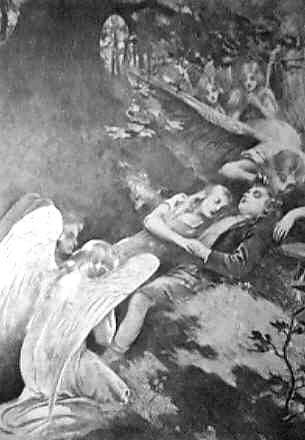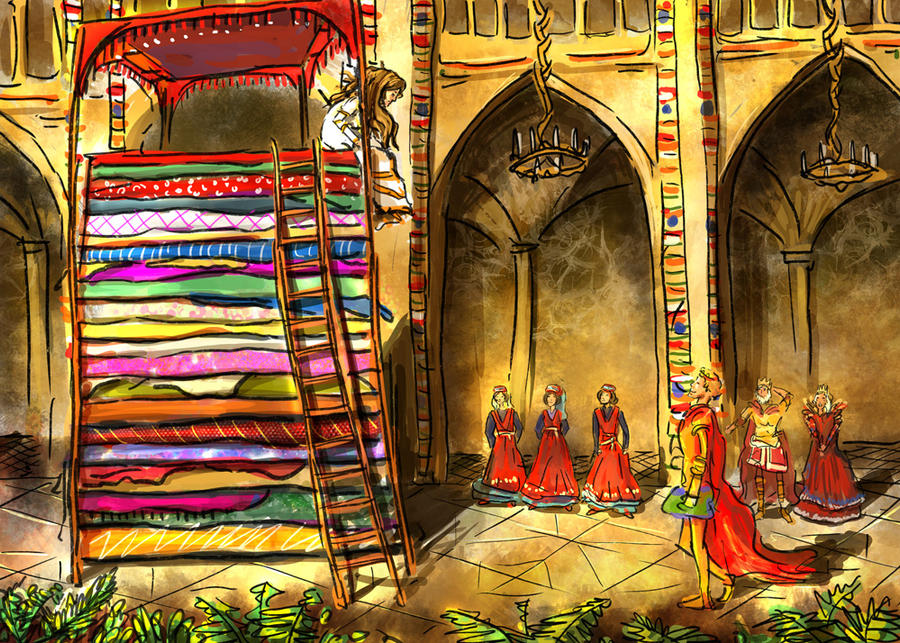With my son Pearson almost 2 months old now, I have never been more sleep deprived in my life. Sleeping during the day when the baby sleeps, the advice you're usually given, is not as easy as it sounds-especially when you've always had a mild case of insomnia. I always used to think the main character in "Princess and the Pea" was too unrelatable-who wants to be a Princess who's too pampered and sensitive? But when I started to think of the pea as being the thoughts that keep me up at night, or a brain that takes a long time to relax, I now think of it in a whole new light.
Viktor Mikhaylovich Vasnetsov
I also find it very ironic that "Sleeping Beauty" begins with the desire for a child and then involves a supernaturally long sleep. By now, the mere thought of getting a full 8 hours of uninterrupted sleep is a longed-for fantasy, so rather than seeming like a curse, the idea of a 100 year's nap sounds wonderful. Maybe the sleeping princess isn't a way to condition little girls to be passive, but sometimes simply the parents telling a story expressing their own desire for sleep after that beloved baby finally arrives.
Yet, sleep functions very differently in other tales. In Animal Bridegroom stories, such as "East of the Sun and West of the Moon," the heroine disobeys the warning not to look at husband while asleep, and must go on a journey to find him. In many versions, she often then finds him engaged to another woman, where she finds a way to come to him at night but he is in a drugged sleep. Sleep is a source of temptation and an obstacle to be overcome in these instances.
 Sleep can also be a dangerous, unguarded time, for heroes and villains. In "Hop o' My Thumb," the titular main character tricks the ogre into killing his sleeping daughters instead of himself and his brothers, and they use the rest of the night to escape. Many protagonists must escape a villain's house during the night, under the cover of darkness-so what is risky for one character is protection for another.
Sleep can also be a dangerous, unguarded time, for heroes and villains. In "Hop o' My Thumb," the titular main character tricks the ogre into killing his sleeping daughters instead of himself and his brothers, and they use the rest of the night to escape. Many protagonists must escape a villain's house during the night, under the cover of darkness-so what is risky for one character is protection for another.In the "Twelve Dancing Princesses," their lack of sleep part of an ambiguous curse; it's the Prince's avoiding sleep that allows him to find the truth. Same with Hansel and Gretel-they overhear what their parents intend to do to them overnight, and Hansel gathers the pebbles while their parents are sleeping. Later, it's while they sleep in the forest that their parents abandon them, sleep once again functioning as danger.
What other fairy tales are there that feature sleep/lack of sleep?
Illustration-William de Leftwich Dodge, 1899



Ah sleep - I feel your pain with insomnia. Clearly you have it worse with Pearson, but it will pass in time. Hang in there :) But it is frustrating when despite being so tired you still just cannot turn your brain off and sleep. I wish I was one of those people who could sleep through anything!
ReplyDeleteHadn't even thought of the pea as a metaphor before. Really does put the story in a whole new light.
For other tales involving sleep, I thought of Vasilisa the Fair. Once Baba Yaga is asleep she is able to bring out the doll to help her. So sleep gives her protection, and a way to keep her secret. Also, the doll does the work for her whilst she herself sleeps, showing how sleep can be rejuvenating and help to solve problems. Also, during the day when it's inanimate I guess the doll is technically sleeping as well. So different sleeping habits can work together.
ooh yes Vasilisa is a perfect example! I especially like thinking of the doll's sleep contrasting with Vasilisa's/the human world's
DeleteI hadn't heard of Vasilisa before. Thank you for the heads up! I hope you're feeling more rested these days.
DeleteIn some versions of the Frog Prince he has to sleep in the princess's bed. And Beauty has dream sequences in Beauty and the Beast.
ReplyDeleteI'm also reminded of Kate Crackernuts, which is a little like a gender-swapped version of the Twelve Dancing Princesses.
Frog Prince is interesting-the idea of sleeping with a frog in her bed is clearly distressing to the Princess, yet I don't think they ever get to the sleeping part, she usually throws him against the wall first!
DeleteThe Villeneuve BATB is a good story to think of too. In fact dreaming in fairy tales is probably a whole different topic to explore...
And Kate Crackernuts is an excellent example to include, especially of a tale in which it's a female staying awake and doing the rescuing.
I think I've read that particularly for insomniacs irregular sleep schedules á la "sleep when the baby is asleep" aren't recommended, but you better ask your doctor or midwife about that.
ReplyDeleteA lot of fairy tale analysis is quite child-centric and generally that's a good thing, but often it's forgotten that most of the time it's adults that tell these stories to children and bring in their own viewpoint.
Lullabies show that perhaps more clearly, often including a mother's problems or anxities. Pre-enlightenment songs are more crass about this, often attempting to scare children into falling asleep, but in more modern lullabies a close listener can find a subtext not intended for children as well. The book "Go the F*ck to Sleep" is a comedic look at parents letting shine through their true feelings during the bedtime ritual.
Many stories feature the (mostly male) protagonist having to stay awake till late at night. Ironically few heroes succeed by actually staying up.
In "The Fire Bird" Ivan falls asleep, but is awoken by the Firebird's bright glow - interestingly his brothers who failed did not.
In some tales the hero has to keep watch in front of or in tje princess's bedroom as a final test before marrying her. Often the princess is actually kidnapped, because he fell asleep and he has to rescue her before dawn. In an English fairy tale the princess likes him so she simply lies to her father, claiming Jack was up all night.
The stories that feature a hero failing to stay up, but aeakening at the nick of time to catch the Firebird, rescue the princess etc., the message seems to be that it is impossible to be prepared (stay awake) at all times, instead it is important to react (wake up) quickly and appropriately when an opportunity (Firebird)/a problem (kidnapping) presents itself
I totally agree that we should consider the perspective of the tellers of tales and not just children, especially since until relatively recently fairy tales were told to everyone and not just intended for children!
DeleteFirebird is a great example. It seems ironic, because being a light sleeper doesn't necessarily help us get good quality sleep, but in earlier times it would have helped keep you alive when problems arose!
So - in those Bridegroom tales, when the husband is in a drugged sleep - is it in THOSE instances that sleep is an obstacle to be overcome?
ReplyDelete